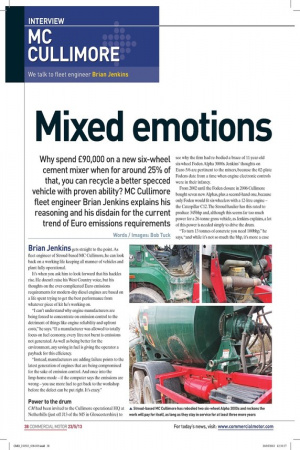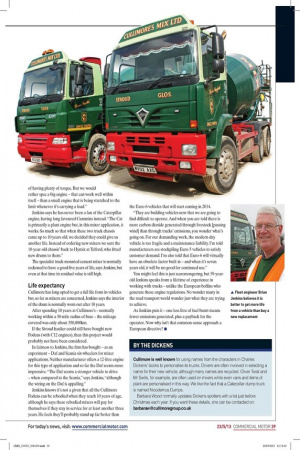Mixed emotions Why spend £90,000 on a new six-wheel cement
Page 31

Page 32

If you've noticed an error in this article please click here to report it so we can fix it.
mixer when for around 25% of that, you can recycle a better specced vehicle with proven ability? MC Cullimore fleet engineer Brian Jenkins explains his reasoning and his disdain for the current trend of Euro emissions requirements Words / Images: Bob Tuck Brian Jenkins gets straight to the point. As fleet engineer of Stroud-based MC Cullimore, he can look back on a working life keeping all manner of vehicles and plant fully operational.
It's when you ask him to look forward that his hackles rise. He doesn't raise his West Country voice, but his thoughts on the ever-complicated Euro emissions requirements for modern-day diesel engines are based on a life spent trying to get the best performance from whatever piece of kit he's working on.
"I can't understand why engine manufacturers are being forced to concentrate on emission control to the detriment of things like engine reliability and upfront costs," he says. "If a manufacturer was allowed to totally focus on fuel economy, every litre not burnt is emissions not generated. As well as being better for the environment, any saving in fuel is giving the operator a payback for this efficiency.
"Instead, manufacturers are adding failure points to the latest generation of engines that are being compromised for the sake of emission control. And once into the limp-home mode — if the computer says the emissions are wrong — you use more fuel to get back to the workshop before the defect can be put right. It's crazy."
Power to the drum CM had been invited to the Cullimore operational HQ at Netherhills (just off J13 of the M5 in Gloucestershire) to see why the firm had re-bodied a brace of 11-year-old six-wheel Foden Alpha 3000s Jenkins' thoughts on Euro-5/6 are pertinent to the mixers, because the 02-plate Fodens date from a time when engine electronic controls were in their infancy.
From 2002 until the Foden closure in 2006 Cullimore bought seven new Alphas, plus a second-hand one, because only Foden would fit six-wheelers with a 12-litre engine — the Caterpillar C12. The Stroud haulier has this rated to produce 345bhp and, although this seems far too much power for a 26-tonne gross vehicle, as Jenkins explains, a lot of this power is needed simply to drive the drum.
"To turn 13 tonnes of concrete you need 100bhp," he says, "and while it's not so much the bhp, it's more a case of having plenty of torque. But we would rather spec a big engine — that can work well within itself — than a small engine that is being stretched to the limit whenever it's carrying a load."
Jenkins says he has never been a fan of the Caterpillar engine, having long favoured Cummins instead. "The Cat is primarily a plant engine but, in this mixer application, it works. So much so that when these two truck chassis came up to 10 years old, we decided they could give us another life. Instead of ordering new mixers we sent the 10-year-old chassis' back to Hymix at Telford, who fitted new drums to them."
The specialist truck-mounted cement mixer is normally reckoned to have a good five years of life, says Jenkins, but even at that time its residual value is still high Life expectancy Cullimore has long opted to get a full life from its vehicles but, so far as mixers are concerned, Jenkins says the interior of the drum is normally worn out after 10 years.
After spending 10 years at Cullimore's — normally working within a 50-mile radius of base — the mileage covered was only about 350,000km.
If the Stroud haulier could still have bought new Fodens (with C12 engines), then this project would probably not have been considered.
In fairness to Jenkins, the firm has bought — as an experiment — Daf and Scania six-wheelers for mixer applications. Neither manufacturer offers a 12-litre engine for this type of application and so far the Daf seems more impressive. "The Daf seems a stronger vehicle to drive — when compared to the Scania," says Jenkins, "although the wiring on the Daf is appalling."
Jenkins knows it's not a given that all the Cullimore Fodens can be rebodied when they reach 10 years of age, although he says these rebodied mixers will pay for themselves if they stay in service for at least another three years. He feels they'll probably stand up far better than the Euro-6 vehicles that will start coming in 2014.
"They are building vehicles now that we are going to find difficult to operate. And when you are told there is more carbon dioxide generated through livestock [passing wind] than through trucks' emissions, you wonder what's going on. For our demanding work, the modern-day vehicle is too fragile and a maintenance liability. I'm told manufacturers are stockpiling Euro-5 vehicles to satisfy customer demand. I'm also told that Euro-6 will virtually have an obsolete factor built in — and when it's seven years old, it will be no good for continued use."
You might feel this is just scaremongering, but 59-yearold Jenkins speaks from a lifetime of experience in working with trucks — unlike the European boffins who generate these engine regulations. No wonder many in the road transport world wonder just what they are trying to achieve.
As Jenkins puts it — one less litre of fuel burnt means fewer emissions generated, plus a payback for the operator. Now why isn't that common-sense approach a European directive? • BY THE DICKENS Cullimore is well known for using names from the characters in Charles Dickens' books to personalise its trucks. Drivers are often involved in selecting a name for their new vehicle, although many names are recycled. Oliver Twist and Mr Swills, for example, are often used on mixers while even vans and items of plant are personalised in this way. We like the fact that a Caterpillar dump truck is named Nicodemus Dumps.
Barbara Wood normally updates Dickens spotters with a list just before Christmas each year. If you want these details, she can be contacted on: barbaraw@cullimoregroup.co.uk









































